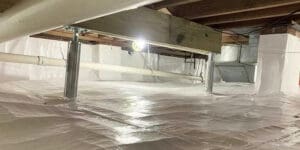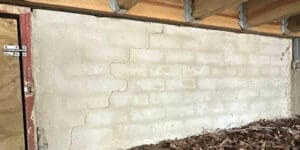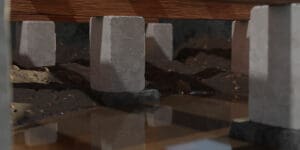More and more homeowners are choosing to spruce up their basements, thus adding to living space. One of the major concerns before work starts is to make sure that the destructive forces of dampness and water are kept at bay as much as humanly possible.
Basement waterproofing becomes a hot topic, and a wide range of subsequent questions arise. And even if you are not planning on finishing off your basement, you still want to maintain the integrity of your home as it is such a big investment. Here is a look at ten of the most common questions and some answers!
1. Can I Waterproof My Basement Myself?
While there are products available in hardware stores and online, it is probably wise to get a professional to evaluate the basement. They know what and where to look for possible current and future issues. If there are issues found, they have the equipment and know-how needed. Choose someone you can trust and consider getting more than one opinion. If you see visible signs of dampness or water intrusion, you need a professional.
2. Is Waterproofing Worth the Cost?
The Environmental Protection Agency put it this way: “Moisture control is fundamental to the proper functioning of any building.” The EPA goes on the state that the control of moisture will safeguard the health of the occupants, the structure, the mechanical systems, and its contents. Very compelling statements, aren’t they?
3. What Are the Signs That I Need Waterproofing?
If you smell musty odors, see mold growth, wet walls, cracks, or holes, you probably have issues. Of course, any amount of water in your basement is a concern.
4. Where Should I Look for Signs of Water or Dampness?
Check where walls meet the floor, around windows or doors, if there are any, and between masonry joints. Pay careful attention to pipes, are they damp to the touch, is there wetness at joints? Inspect the walls and floors for cracks or holes. Paint that bubbles, streaks, or staining on walls or pipes can indicate moisture issues. White powder deposits on the walls – which go by the imposing name of efflorescence, shows that moisture is or has passed through the walls.
5. How Are Basements Waterproofed?
There are three basic approaches and are situation dependent. Drainage systems may, waterproofing may be done on the outside or the inside of the home. Sometimes, in extreme situations, a combination of these may be deemed necessary.
6. What's Involved in Exterior Waterproofing?
The goal here is to protect the foundation of the home. Protecting the foundation means keeping the water away from the inside of the house. And since water problems generally start on the outside of the home, this method makes sense. However, it is often expensive and may involve excavation around the house. After the contractor excavates, exposing the foundation, sealants can be applied. The earth is returned, and any landscaping required replaced. It may seem scarier – but can be the best option in the long run. No pain, no gain.
7. What Happens During Interior Waterproofing?
Any cracks or holes will be filled in with, probably, hydraulic cement. Cold joints – areas located where the walls hit the floors that separate during settling – may be filled in as well. Waterproofing materials (sealants) applied to the walls will combat moisture. However, any efflorescence is present must be removed from the walls before sealing.
8. How Does Drainage Help?
Many moisture issues are caused by improper drainage around the outside of the home. Improper grading, clogged gutters or gutters with water flow not directed at least ten feet away from the house can cause water issues. A drainage system inside the basement can be installed, typically around the perimeter of the walls. The idea is that water is drained away before it hits the floor of the basement.
9. How Long Does Waterproofing Take?
Again, it is dependent on the method of waterproofing chosen. Exterior will take the longest, followed by drainage and then interior waterproofing.
10. What More Can I Do to Protect My Basement?
Make sure that you keep your gutters and downspouts clean. Make sure that water flows away from your home – at least ten feet. Consider landscape runoff when planting and watch after rainstorms to see if there are areas of water pooling in the yard.




